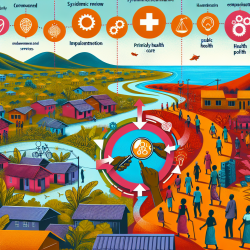Introduction
The Community-based Health Planning and Services (CHPS) initiative in Ghana stands as a beacon of innovation in primary health care delivery. Established over two decades ago, CHPS has been instrumental in reducing under-five mortality and increasing access to essential health services in both rural and urban settings. This blog delves into the insights from a comprehensive review of CHPS, offering practitioners valuable lessons for enhancing their skills and encouraging further research.
Understanding CHPS: A Model of Success
CHPS is built on a foundation of community engagement, utilizing health nurses and volunteers to provide universal access to basic health care, promotion, and prevention services. The program has significantly reduced child mortality and increased family planning acceptance, particularly among the poorest and least educated populations.
The systematic review, "Implementation of the Community-based Health Planning and Services (CHPS) in rural and urban Ghana: a history and systematic review of what works, for whom and why," provides a detailed analysis of the program's effectiveness and the factors influencing its implementation.
Key Lessons for Practitioners
- Community Engagement: The success of CHPS is largely attributed to its strong community involvement. Practitioners should prioritize building trust and engaging local leaders to ensure the program's acceptance and sustainability.
- Adaptability: While CHPS has been effective in rural areas, its implementation in urban settings presents unique challenges. Practitioners must be flexible and adapt strategies to fit the socio-economic and cultural contexts of different communities.
- Resource Allocation: Adequate resources are crucial for the successful implementation of CHPS. Practitioners should advocate for increased funding and support from both government and non-governmental organizations to ensure the program's sustainability.
- Training and Motivation: Continuous training and motivation of community health workers are essential for maintaining high-quality service delivery. Practitioners should focus on providing career progression opportunities and recognition to keep staff motivated.
Encouraging Further Research
The review highlights the need for further research to address the challenges faced in urban settings and to explore innovative solutions for integrating CHPS with private and informal health providers. Practitioners are encouraged to conduct studies that focus on the financial, service provision, and community engagement aspects of CHPS to enhance its effectiveness.
Conclusion
CHPS offers a wealth of lessons for practitioners seeking to improve primary health care delivery. By embracing community engagement, adaptability, resource allocation, and continuous training, practitioners can enhance their skills and contribute to the successful implementation of similar programs globally.
To read the original research paper, please follow this link: Implementation of the Community-based Health Planning and Services (CHPS) in rural and urban Ghana: a history and systematic review of what works, for whom and why.










